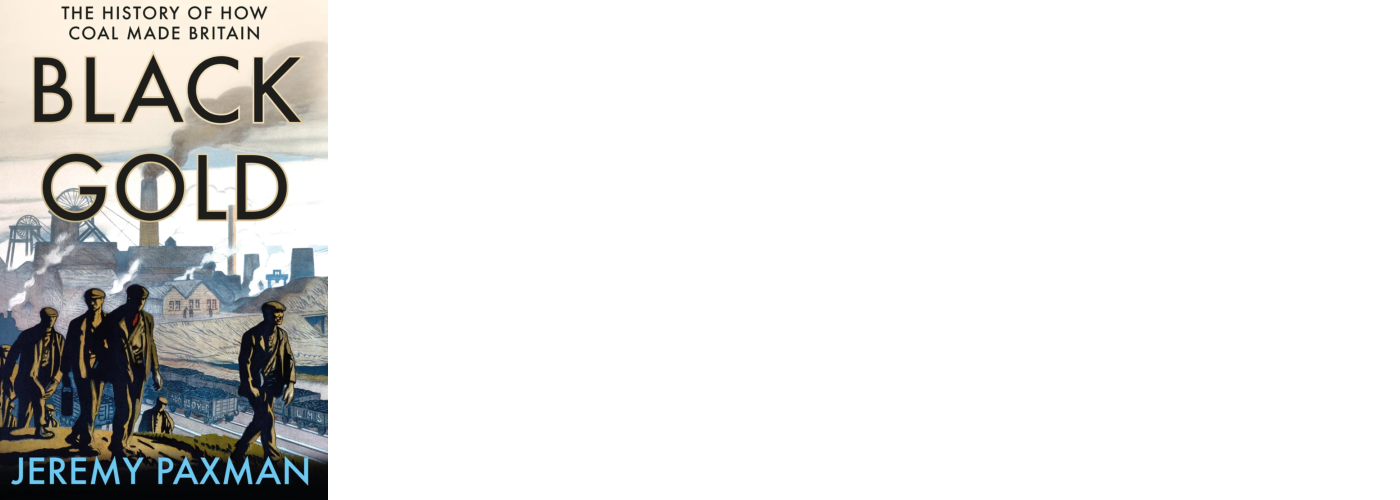Book of the week: Black Gold by Jeremy Paxman
Paxman’s history of coal is told with ‘characteristic panache’

A free daily email with the biggest news stories of the day – and the best features from TheWeek.com
You are now subscribed
Your newsletter sign-up was successful
In today’s ecologically conscious age, a popular history centred on coal “might seem a foolhardy undertaking”, said Dominic Sandbrook in The Sunday Times. But coal’s importance in Britain’s modern history “can hardly be exaggerated”, and Jeremy Paxman has produced a book that “could hardly be more colourful”.
Britain, he points out, would never have become the “world’s first industrial superpower” were it not for coal: this “black gold” powered factories, ships and railways; heated homes and offices; and created towns and villages.
And yet, as he rightly emphasises, coal was “dirty and dangerous” from the start – the cause not only of endemic pollution, but also of many appalling accidents. At Seaton Delaval in 1862, 204 men and boys perished underground when a pumping engine collapsed. An explosion at Senghenydd in 1913 killed 440. Today, such tragedies are largely forgotten – and coal has “almost vanished from our national imagination”. Paxman does a “fine job” of trying to restore it.
The Week
Escape your echo chamber. Get the facts behind the news, plus analysis from multiple perspectives.

Sign up for The Week's Free Newsletters
From our morning news briefing to a weekly Good News Newsletter, get the best of The Week delivered directly to your inbox.
From our morning news briefing to a weekly Good News Newsletter, get the best of The Week delivered directly to your inbox.
Approaching his chosen topic with “characteristic panache”, he shows how coal had an influence “on almost every aspect” of British history over the last few hundred years, said Richard Vinen in Literary Review. He describes the vast fortunes amassed by owners of land from which it was extracted – among them the third Marquess of Bute, who was already one of the world’s richest people when he inherited his title as a baby in 1848.
“The son of a Naval officer, Paxman is particularly good on the role that coal-fuelled ships played in establishing the hegemony of the Royal Navy, and thus also of the British empire.” Such ships, he points out, were not only faster than their predecessors, but also better protected – even the coal itself, stored in bunkers on their flanks, sometimes stopped projectiles.
“In the 20th century, coal’s dark history came back to bite it,” said Emma Duncan in The Times. As a fuel for ships, it was supplanted by oil, which “produced four times as much energy, pound for pound”. Its decline was hastened, too, by strained industrial relations” – miners were “readier to strike” than other workers, and the “industry was appallingly run”.
Paxman ends his narrative with the 1984 miners’ strike–an event that had a scarring impact upon the nation, but which was also in a sense unnecessary, since decades of stalling productivity had already “doomed the coal industry”. Nonetheless, it provides a “dramatic finale” to a “vividly told” and enjoyable book that “throws new light on familiar features of our national landscape”.
A free daily email with the biggest news stories of the day – and the best features from TheWeek.com
William Collins 392pp £25; The Week Bookshop £19.99

The Week Bookshop
To order this title or any other book in print, visit theweekbookshop.co.uk, or speak to a bookseller on 020-3176 3835. Opening times: Monday to Saturday 9am-5.30pm and Sunday 10am-4pm.
-
 What to know before filing your own taxes for the first time
What to know before filing your own taxes for the first timethe explainer Tackle this financial milestone with confidence
-
 The biggest box office flops of the 21st century
The biggest box office flops of the 21st centuryin depth Unnecessary remakes and turgid, expensive CGI-fests highlight this list of these most notorious box-office losers
-
 What are the best investments for beginners?
What are the best investments for beginners?The Explainer Stocks and ETFs and bonds, oh my
-
 A thrilling foodie city in northern Japan
A thrilling foodie city in northern JapanThe Week Recommends The food scene here is ‘unspoilt’ and ‘fun’
-
 Tourangelle-style pork with prunes recipe
Tourangelle-style pork with prunes recipeThe Week Recommends This traditional, rustic dish is a French classic
-
 Samurai: a ‘blockbuster’ display of Japan’s legendary warriors
Samurai: a ‘blockbuster’ display of Japan’s legendary warriorsThe Week Recommends British Museum show offers a ‘scintillating journey’ through ‘a world of gore, power and artistic beauty’
-
 BMW iX3: a ‘revolution’ for the German car brand
BMW iX3: a ‘revolution’ for the German car brandThe Week Recommends The electric SUV promises a ‘great balance between ride comfort and driving fun’
-
 Arcadia: Tom Stoppard’s ‘masterpiece’ makes a ‘triumphant’ return
Arcadia: Tom Stoppard’s ‘masterpiece’ makes a ‘triumphant’ returnThe Week Recommends Carrie Cracknell’s revival at the Old Vic ‘grips like a thriller’
-
 My Father’s Shadow: a ‘magically nimble’ love letter to Lagos
My Father’s Shadow: a ‘magically nimble’ love letter to LagosThe Week Recommends Akinola Davies Jr’s touching and ‘tender’ tale of two brothers in 1990s Nigeria
-
 Send Help: Sam Raimi’s ‘compelling’ plane-crash survival thriller
Send Help: Sam Raimi’s ‘compelling’ plane-crash survival thrillerThe Week Recommends Rachel McAdams stars as an office worker who gets stranded on a desert island with her boss
-
 Book reviews: ‘Hated by All the Right People: Tucker Carlson and the Unraveling of the Conservative Mind’ and ‘Football’
Book reviews: ‘Hated by All the Right People: Tucker Carlson and the Unraveling of the Conservative Mind’ and ‘Football’Feature A right-wing pundit’s transformations and a closer look at one of America’s favorite sports